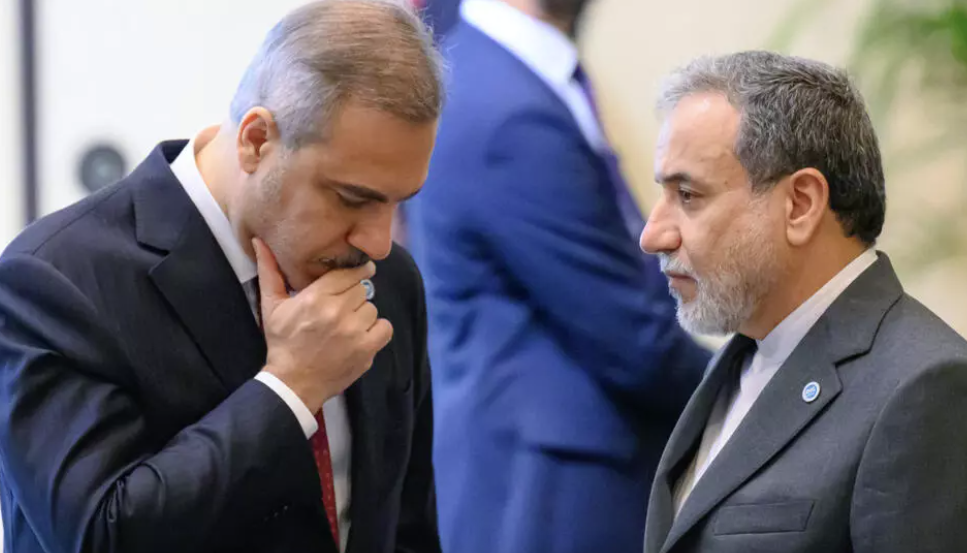« Turkey has spent weeks walking a diplomatic tightrope, caught between its outrage over Israel’s actions and its reluctance to cross the United States. A ceasefire deal brokered by President Donald Trump has given Ankara some breathing room – at least for now.
We welcome the news that an agreement has been reached on the establishment of a ceasefire between Israel and Iran, which came late last night,” Erdogan said before departing for the NATO summit in The Hague.
Israel’s war on Iran had put Erdogan in a tricky spot – maintaining his hostility towards Israel without damaging his ties with Trump.
On Saturday, Erdogan slammed Israel, calling it a “terrorist state”, while warning that the war on Iran threatened to plunge the region into chaos. The speech, delivered in Istanbul at a meeting of the Organisation of Islamic Cooperation, was just the latest in what has become an almost daily verbal assault on Israel.
But the United States bombing of Iran just a few hours after Erdogan spoke drew little reaction from Ankara beyond a short statement expressing its “concern” over the attack.
Turkey’s rivalry with Iran shifts as US threats create unlikely common ground
Words versus actions
Erdogan’s actions have also not always matched his rhetoric.The Turkish leader resisted opposition calls to close the US-operated NATO Kurecik radar base near the Iranian border.
“Turkey is not interested once again in going into conflict with America because, if you close Kurecik, then it is a NATO issue, and Israel has close relations also with NATO,” said international relations professor Huseyin Bagci of Ankara’s Middle East Technical University.
The Kurecik radar station, Bagci said, is important to Israeli security.
“Turkey signed the acceptance (agreement) that Israel should take information from Kurecik,” Bagci added. “There is no in an article in the case of war that Turkey would not provide the information. So, this is why Erdogan, based on this fact, is not undertaking any steps against Israel.”
Earlier this month, Erdogan lobbied Baghdad not to follow Tehran’s calls to intercept Israeli warplanes using Iraqi airspace to strike Iran. All moves that are likely to play well with Trump. Erdogan values what Trump has called a “great friendship”.
The two leaders are expected to meet for the first time since Trump’s re-election on the sidelines of the NATO summit in The Hague, where Erdogan will likely be seeking an invitation to Washington.
With Turkey and Iran long-time regional rivals, competing for influence from the Caucasus to Central Asia and the Middle East, Ankara also shares the West’s concerns over Tehran’s nuclear programme.
“Turkey definitely doesn’t want a nuclear-armed Iran, because that is going to trigger a proliferation process in the Middle East,” said Serhan Afacan, head of the Center for Iranian Studies, a research organisation in Ankara.
Interim president Sharaa weighs up Ankara and Riyadh in power struggle for Syria
Refugee fears and regional risks
The United States bombing of Iran’s nuclear facilities – which Washington claims has ended Tehran’s atomic programme – drew no condemnation from Ankara. But the risk of a wider conflict has raised fears of growing instability and the possibility of a refugee wave into Turkey from Iran.
Trump’s surprise move to broker a ceasefire between Iran and Israel will come as a relief to Ankara, said regional expert Professor Zaur Gasimov of the German Academic Exchange Service in Istanbul. He warned the ceasefire came just as signs were emerging of a refugee exodus.
“What we see now is already now is the mobility of people within Iran, leaving Tehran and other bigger cities, going to different directions, that is a challenge for the entire region. And maybe Turkey is a country that is about to observe a refugee influx coming from Iran by the border,” said Gasimov.
He warned Ankara is likely not prepared for such an exodus.
“That is a challenge. So, Turkey is currently observing the situation with great attention, and certain answers to this challenge is not ready yet,” said Gasimov.
Azerbaijan and Turkey build bridges amid declining influence of Iran
Economic toll
Turkey, which borders Iraq and Syria, has struggled for decades with chaos on its southern frontier. It currently hosts as many as five million refugees and has paid a heavy economic price through the loss of valuable regional markets.
Ankara will likely be eyeing the potential rewards of a weakened Tehran in the long-running competition for regional influence.
“A weak Iran is good for Turkey always, but not a dead Iran,” said Bagci.
“Iran is important for connectivity. They [Iran] have many neighbours like Turkey. They are close to Russia, Central Asian republics, Pakistan, and Afghanistan, you name it. And the destabilisation of the region is in nobody’s interest.
« That is why China and Russia are very careful in their statements, and everybody is trying now for a diplomatic solution.”
How long Trump’s brokered ceasefire will last remains to be seen. But for Ankara, the hope is that wider regional chaos has been avoided – and that it has managed, at least for now, to balance its competing interests.
By:Dorian Jones

